|
|
|
Sort Order |
|
|
|
Items / Page
|
|
|
|
|
|
|
| Srl | Item |
| 1 |
ID:
143798
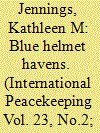

|
|
|
|
|
| Summary/Abstract |
It is commonly argued that international peace interventions will work better and more empathetically if the prevailing separation between international interveners and local people is lessened. However, I argue that, outside the microeconomic interactions and transactional relationships that comprise the peacekeeping economy, peacekeeping is characterized by bypassing – intentional circumvention – or simple exclusion of the local. Drawing on fieldwork in Liberia and the Democratic Republic of the Congo, I argue that the rules and regulations, norms and architecture of UN peacekeeping all favour and are actively disposed to bypass or exclude. Accordingly, insofar as lessening the separation between internationals and locals is necessary to enable more effective and, ideally, empathetic peacekeeping, what is needed is systemic change that runs counter to the – mostly deliberate – policies that have been enacted to effectuate and retain this very separation over the past decade or more. The likelihood of such change is small.
|
|
|
|
|
|
|
|
|
|
|
|
|
|
|
|
| 2 |
ID:
131863


|
|
|
|
|
| Publication |
2014.
|
| Summary/Abstract |
THERE HAS BEEN no stable peace for a long time now in the Democratic Republic of the Congo (DRC or DR Congo), the key Central African country. Latent war in its eastern provinces has been going on for longer than one decade wiping off its democratic achievements and impeding the country's development. Arbitrary actions of the military, mass rapes, tortures, and the turning into slaves of young children and teenagers make thousands of people abandon their homes and flee for safety.1
|
|
|
|
|
|
|
|
|
|
|
|
|
|
|
|
| 3 |
ID:
172348
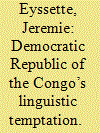

|
|
|
|
|
| Summary/Abstract |
The aim of this article is to assess whether the Democratic Republic of the Congo (DR Congo) is likely to upgrade the status of English by constitutional or educational means. Indeed, neighboring countries such as Rwanda and Burundi adopted English as their official language in 1996 and 2014, but less writing in English is devoted to a potential linguistic transition in DR Congo, the most populous French-speaking country. This article will gauge DR Congo and Rwanda against the four criteria that arguably triggered Rwanda’s switch-to-English: historical factors in current linguistic trends; the role of charismatic leaders in sudden language policy changes; language-in-education policies; and economic incentives. The results of this interdisciplinary investigation into the language dynamics of the Great Lakes region indicate that, reflecting the vehicles of DR Congo’s domestic and regional evolutions, its leaders might be tempted to enhance the status of English as an official language in a way that, contrary to Rwanda’s radical switch-to-English, is more compatible with other languages.
|
|
|
|
|
|
|
|
|
|
|
|
|
|
|
|
| 4 |
ID:
126859


|
|
|
| 5 |
ID:
154073
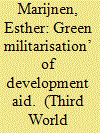

|
|
|
|
|
| Summary/Abstract |
To ‘save’ the Virunga National Park, located in the east of the Democratic Republic of the Congo, the European Commission (EC) allocates development aid to the paramilitary training of the park guards, their salaries, and mixed patrols of the guards together with the Congolese army. Moreover, the ‘development’ projects the EC supports around the park have militarising effects as they are based on a soft counter-insurgency approach to conservation and to address dynamics of violent conflict. This amounts to the ‘green militarisation’ of development aid. This article describes how a personalised network of policymakers within the EC renders militarised conservation-related violence and controversy around the Virunga park invisible, by framing contestations and violence in and around the park as solely caused by economic factors and motivations. Moreover, by ‘hiding’ the fact that the EC aid is used to fund armed conservation practices, policymakers circumvent political debate about the use of development funds for (para)military expenditures. While the existing literature focuses on the importance of securitised discourses to explain the militarisation of conservation, this article indicates that in addition, it is important to focus on these more mundane practices of securitisation within international organisations that ultimately fund the militarisation of conservation.
|
|
|
|
|
|
|
|
|
|
|
|
|
|
|
|
| 6 |
ID:
146003


|
|
|
|
|
| Summary/Abstract |
The main significance and novelty of the Intervention Brigade established by the United Nations (UN) Security Council in March 2013 in the Democratic Republic of the Congo have previously been attributed to its robust mandate, enhanced capacities and offensive concept of operations. At the tactical, strategic and doctrinal levels of analysis, the Brigade could be considered a continuum of the robust and technological turn of UN peacekeeping, which has continued for more than a decade and is reinvigorated in the so-called new generation of peacekeeping tactics outlined in the New Horizon document. However, this article argues that the most profound significance and novelty of the Brigade reside at the underlying paradigmatic level, which has been ignored in the previous literature. The Brigade embodies not only robust capacities and mandate (peacekeeping with muscles) but also a new peacekeeping paradigm, namely, sovereignty-building (peacekeeping for body politic). The sovereignty-building paradigm is aimed at creating or strengthening the positive and negative sovereignty of the host government. The Brigade reinforces the positive sovereignty of the Congolese government by boosting its self-directive domestic and foreign policy, political will, ownership and responsibility vis-à-vis its regional peers, for example, by making its exit strategy conditional on the Congolese own Rapid Reaction Force. With regard to negative sovereignty, the Brigade contributes to the reinstatement of territorial integrity and supreme state authority by neutralising militia groups.
|
|
|
|
|
|
|
|
|
|
|
|
|
|
|
|
| 7 |
ID:
122187


|
|
|
|
|
| Publication |
2012.
|
| Summary/Abstract |
Dominant narratives of war in the Democratic Republic of the Congo and the Great
Lakes region have emphasised the use of mass rape as a weapon of war that is primarily used against women. Georgina Holmes argues the need to go beyond this reductionist interpretation: mass rape is perpetrated against women, men and boys, and is an extreme form of violence against the community which effectively constitutes 'genocide by attrition'.
|
|
|
|
|
|
|
|
|
|
|
|
|
|
|
|
| 8 |
ID:
185163


|
|
|
|
|
| Summary/Abstract |
In spite of a vibrant debate about the genesis, logic and effects of peace operations, peace research remains poorly equipped to account for how policies are implemented and ‘translated into practice’ – issues that have been the focus in implementation studies for nearly five decades. In response, we propose a merger of certain strands of peace research with bottom-up implementation studies, which forefronts the role of ‘implementing actors’, namely, those actors who are granted the discretionary powers to carry out policies in their daily encounter with local counterparts on the ground. Through a case study of peace operations in the Democratic Republic of the Congo (DRC), we show that successful policy implementation depends on that field-based implementing actors are provided with discretionary powers to use their skill, judgement and local knowledge to solve problems and ensure implementation of peace operations on the ground. There is a need for a paradigm change within peace research in order to account for these findings. Better understanding of the daily work carried out by implementing actors in the field makes it possible to avoid many of the pitfalls and shortcomings we have witnessed through several decades of flawed or even devastating peace operations such as the one in DRC.
|
|
|
|
|
|
|
|
|
|
|
|
|
|
|
|
| 9 |
ID:
189896
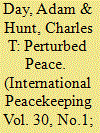

|
|
|
|
|
| Summary/Abstract |
This article explores the application of complexity theory to UN peacekeeping. To date, peacekeeping has been dominated by linear models of change, assuming that conflict settings can be addressed by elite-driven peace processes, gradual improvements to state institutional capacity, and development programming. However, this article argues that complexity theory offers a far more accurate and useful lens through which to view the work of peacekeeping: conflict settings represent complex, interdependent socio-political systems with emergent qualities giving them the capacity to self-organize via feedback loops and other adaptive activity. Self-organization means such systems are highly resistant to attempts to change behaviour via top-down or input-output approaches. In fact, peacekeeping itself is endogenous to the systems it is trying to change, often displaying the same kinds of self-organization typical of complex systems elsewhere. Drawing on experience working and conducting fieldwork in the UN peacekeping mission in Democratic Republic of the Congo, this article argues that UN peacekeeping operations should view themselves as actors within the complex conflict ecosystem, looking to enable transformational change from within, rather than impose liberal Western models from without.
|
|
|
|
|
|
|
|
|
|
|
|
|
|
|
|
| 10 |
ID:
135230
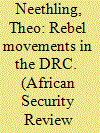

|
|
|
|
|
| Summary/Abstract |
Despite a generally valiant effort on the part of the United Nations (UN) since 1999 to bring peace and stability to the Democratic Republic of the Congo (DRC), the country continues to be destabilised by rebel forces. These armed movements pose a constant threat to the fragile transition in the DRC, and security in the country is continuously undermined. This article examines rebel forces in the DRC from two perspectives. Firstly, it examines such movements as a manifestation of sub-national terrorism. Secondly, it examines armed movements from the perspective of so-called ‘ungoverned spaces’. The view taken in this article supports the scholarly insight and argument that in countries such as the DRC, armed movements and militias are filling power vacuums that are the result of the inability and lack of military capacity of weak states to fight these movements effectively. Specifically, the eastern and north-eastern parts of the DRC have been major conflict zones where sub-national terrorists employ terror as a strategy. In this context, the DRC is severely affected by terrorism – a phenomenon in the DRC that is intimately linked to the failure to effect sustained development and to consolidate accountable and effective governance.
|
|
|
|
|
|
|
|
|
|
|
|
|
|
|
|
| 11 |
ID:
160683


|
|
|
|
|
| Summary/Abstract |
This article examines the smuggling of coltan into and out of artisanal mining areas in northern Katanga where the ITRI Tin Supply Chain Initiative (iTSCi), a policy on conflict minerals, tries to improve transparency in trading tin, tantalum (coltan) and tungsten. The article approaches smuggling from a sociology of economic life perspective, closely examining how and why artisanal miners and mine-based middlemen (négociants) helped smugglers (hiboux) in the trafficking of coltan. The findings indicate that the social networks in which miners and mine-based négociants are embedded allow the miners, négociants and smugglers to maintain close relationships and to breach official regulations, but miners and mine-based négociants also rely on the same networks to cheat in their dealings with the smugglers. This article concludes that, rather than considering coltan mining areas to be ‘enclaves of regulations’, understanding and addressing smuggling at both local and broader contexts call for a comprehensive, more contextualised approach.
|
|
|
|
|
|
|
|
|
|
|
|
|
|
|
|
| 12 |
ID:
097769


|
|
|
|
|
| Publication |
2010.
|
| Summary/Abstract |
The collapse of Mobutu's Zaire and the arrival of father and son Kabila regimes in the Democratic Republic of the Congo (hereafter, the DRC) were hastened by the dramatic and tumultuous spread of violence from neighboring Rwanda. Mobutu's state's inability to manage the influx of Hutu refugees (with Interahamwe militia members interspersed) into the Kivu province of eastern Zaire from Rwanda's bloody genocide of 1994 or to compensate for the ratcheting up of their cross-border skirmishes with the Banyamulenge (Zairean Tutsi) population in 1996, exacerbated extant tensions and has since resulted in more than a dozen years of civil war. This example prompts us to ask: are countries with higher levels of state capacity better able to resist the spread of violence from neighboring territories into their own? The author argues that when falsely divided notions of spatial heterogeneity and dependence are interacted, contagion from neighboring conflicts becomes a risk of diminishing value for increasingly capable states. A model of civil war contagion affirms a conditional hypothesis, showing that state capacity modifies the likelihood that a state will become infected by a civil conflict occurring in neighboring territories.
|
|
|
|
|
|
|
|
|
|
|
|
|
|
|
|
| 13 |
ID:
146281
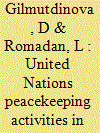

|
|
|
|
|
| Summary/Abstract |
THE UNITED NATIONS peacekeeping operations are a key means of settlement of armed conflicts and post-conflict political normalization. Due to the escalation of some conflicts, they are more important in the 21st century than ever before.
|
|
|
|
|
|
|
|
|
|
|
|
|
|
|
|
| 14 |
ID:
186001


|
|
|
|
|
| Summary/Abstract |
This paper examines the role of United Nations (UN) peacekeeping operations in modern conflict. It advocates for a new peacekeeping doctrine for stabilisation operations. The UN has authorised four such stabilisation missions, wading into challenging frontiers of asymmetrical warfare, endemic conflict, and multidimensional mandates. This article begins by surveying discourse on stabilisation at the UN, among its key members, and among the academic community. It highlights the penchant for strategic ambiguity that has prevented the UN from establishing clear stabilisation doctrine for its Blue Helmets. It then analyses the two case studies of Haiti and the Democratic Republic of the Congo (DRC), the UN’s first two forays into official stabilisation operations. Evaluating them along the three axes of security, state consolidation, and political reconciliation, this article draws lessons learned and makes recommendations for a clear, modern UN stabilisation doctrine.
|
|
|
|
|
|
|
|
|
|
|
|
|
|
|
|
| 15 |
ID:
190720


|
|
|
|
|
| Summary/Abstract |
The fascination with special forces could be ascribed to the prominence of their use in contemporary conflicts across the globe. There is, however, a paradox of employing such a highly lethal force in order to pursuit peace. With peacekeeping evolving parallel with the strategic environment, especially in Africa, the trend towards more robust interventions has become prevalent since the end of the Cold War. As such, the requirement for accurate and timely intelligence in peace missions has become crucial. Admittedly, special forces would not necessarily be the soldiers expected to wear blue berets and participate in peace missions. It may come as a surprise to the uninformed, though, to learn that special forces have indeed participated, and are still involved, in peace missions across the globe. Drawing from a case study where special forces have been involved in peace missions under the umbrella of the United Nations in the Democratic Republic of the Congo, this article investigates the utilization of special forces and the role they could play in peace missions in Africa.
|
|
|
|
|
|
|
|
|
|
|
|
|
|
|
|
|
|
|
|
|